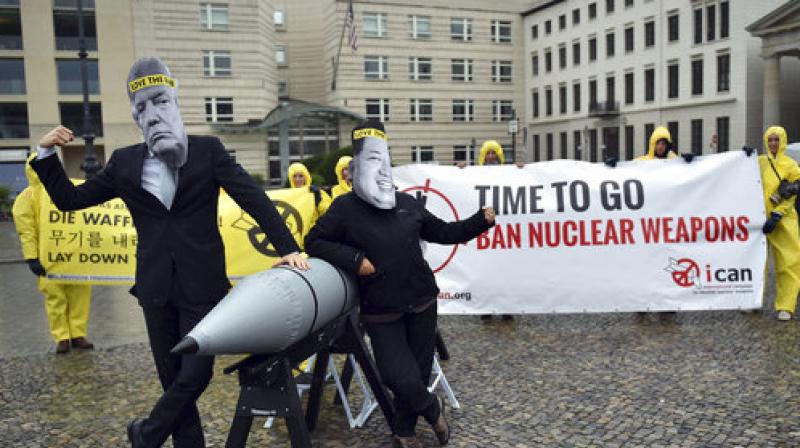ICAN anti-nuclear weapons campaign wins 2017 Nobel Peace Prize
ICAN has in the past year given the efforts to achieve a world without nuclear weapons a new direction and new vigour.

The International Campaign to Abolish Nuclear Weapons (ICAN) is the winner of the 2017 Nobel Peace prize.
The chair of the Norwegian Nobel Committee, Berit Reiss-Andersen, said the award had been made in recognition of “for its work to draw attention to the catastrophic humanitarian consequences of any use of nuclear weapons and for its ground-breaking efforts to achieve a treaty-based prohibition of such weapons”.
BREAKING NEWS The 2017 Nobel Peace Prize is awarded to the International Campaign to Abolish Nuclear Weapons (ICAN) @nuclearban #NobelPrize pic.twitter.com/I5PUiQfFzs
— The Nobel Prize (@NobelPrize) October 6, 2017
ICAN describes itself as a coalition of grassroots non-government groups in more than 100 nations. It began in Australia and was officially launched in Vienna in 2007.
A great honour that we have just been awarded the Nobel Peace Prize 2017 for our work to outlaw nuclear weapons. #nuclearban #nobelprize pic.twitter.com/EOOtdzNXtN
— Tim Wright (@TimMilesWright) October 6, 2017
In July, 122 nations adopted a U.N. Treaty on the Prohibition of Nuclear Weapons, but nuclear-armed states including the United States, Russia, China, Britain and France stayed out of the talks.
The Nobel prize seeks to bolster the case of disarmament amid nuclear tensions between the United States and North Korea and uncertainty over the fate of a 2015 deal between Iran and major powers to limit Tehran’s nuclear programme.
U.S. President Donald Trump has called the Iran agreement the “worst deal ever negotiated” and a senior administration official said on Thursday that Trump is expected to announce soon that he will decertify the landmark pact.
The coveted prize is given to a person, or group of people, who have “done the most or the best work for fraternity between nations”.
Since 1901, 97 Nobel peace prizes have been awarded to 30 different laureates. Malala Yousafzai, Martin Luther King and Mother Teresa are among that distinguished group.
The Geneva-based organization ICAN "has been a driving force in prevailing upon the world's nations to pledge to cooperate ... in efforts to stigmatize, prohibit and eliminate nuclear weapons," committee chairwoman Berit Reiss-Andersen said in the announcement.
She noted that similar prohibitions have been reached on chemical and biological weapons, land mines and cluster munitions.
"Nuclear weapons are even more destructive, but have not yet been made the object of a similar international legal prohibition," she said.
Swedish Foreign Minister Margot Walsstrom said that giving the prize to ICAN was "well-deserved and timely."
Walsstrom said that the organization has been working hard since 2007 and "we know how serious the situation is around in the world."
Reiss-Andersen said "through its inspiring and innovative support for the U.N. negotiations on a treaty banning nuclear weapons, ICAN has played a major part in bringing about what in our day and age is equivalent to an international peace congress."
Asked by journalists whether the prize was essentially symbolic, given that no international measures against nuclear weapons have been reached, Reiss-Andersen said "What will not have an impact is being passive."
The director of the anti-nuclear campaign that won this year's Nobel Peace Prize says that "it sends a message to all nuclear-armed states and all states that continue to rely on nuclear weapons for security that it is unacceptable behavior."
Beatrice Fihn, executive director of the Geneva-based International Campaign to Abolish Nuclear Weapons, told reporters that "we can't threaten to indiscriminately slaughter hundreds of thousands of civilians in the name of security. That's not how you build security."
Fihn said that the group has received a phone call minutes before the official announcement was made that ICAN had won the prize. But she thought it was "a prank" and she didn't believe it until heard the name of the group during the Peace Prize announcement in Oslo.

